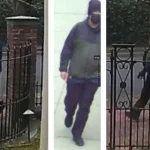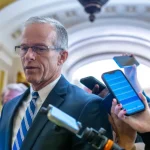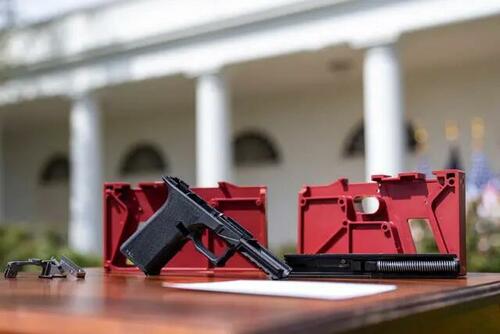
Authored by Caden Pearson via The Epoch Times (emphasis ours)
The ongoing legal battle over "ghost guns" has returned to the U.S. Supreme Court, where the Biden administration aims to regain authority over these "untraceable firearms," following a recent victory for Second Amendment advocates.

On Thursday, roughly two months after it last brought this case to the Supreme Court, the Biden administration once again asked the justices to reinstate Bureau of Alcohol, Tobacco, Firearms and Explosives (ATF) regulations on "ghost guns.”
Solicitor General Elizabeth Prelogar told the justices that on Sept. 14 a lower court, the U.S. District Court for the Northern District of Texas, effectively undermined an Aug. 28 order by the nation's highest court.
"This is the rare application where this Court has already applied the relevant legal standard in the very same case and determined the government should obtain emergency relief," wrote Mr. Prelogar in her petition.
"The Court's answer should be the same as it was two months ago,” she added, having argued that without the Supreme Court's relief, “untraceable ghost guns will remain widely available.”
The prior Aug. 28 high court order in question was an administrative stay issued by Justice Samuel Alito that allowed the enforcement of an ATF rule designed to regulate "ghost guns" by defining them as firearms.
“Ghost guns” is a pejorative term for partially completed frames and kits that can be purchased and assembled into functional firearms. The Biden administration wants to impose a rule that makers of these “ghost guns” must obtain licenses, mark their products with serial numbers, maintain transaction records, and conduct background checks.
This rule was first blocked nationwide by Judge Reed O'Connor of the Northern District of Texas, an appointee of former President George W. Bush, on July 5. This ruling was then challenged in the Supreme Court, where Justice Alito intervened, issuing a temporary administrative stay.
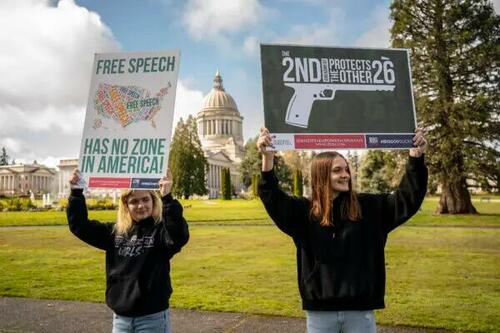
'Biden Admin Is Now in the Worst Place They Could Be'
Following the high court's stay, two of the plaintiffs, a pair of firearm frame and receiver makers, returned to the Texas district court, asking it to enjoin the ATF from enforcing the rule specifically against them pending appeal.
Judge O'Connor granted this extraordinary relief on Sept. 14. Furthermore, the Fifth Circuit Court of Appeals subsequently partially upheld the district court's ruling.
"[C]ourts should be able to review ATF’s 98-page rule, and the decades of precedent it attempts to change, without the Government putting people in jail or shutting down businesses," the Firth Circuit Court of Appeals ruling stated.
This ruling effectively allowed the two plaintiff companies, Defense Distributed and 80 Percent Arms, to hold a monopoly as the only businesses allowed to sell firearm frames and kits to make "ghost guns" while appeals proceedings play out—a fact they touted in gloating statements following the ruling.
"The Biden admin is now in the worst place they could be: The true believer fanatics in this industry have achieved [a] commercial monopoly. Oops," Defense Distributed stated in a blog post on Sept. 14.
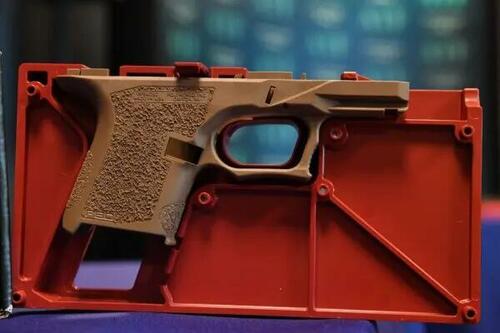
In an Oct. 2 statement, 80 Percent Arms said they remain unwaveringly dedicated to "champion[ing] the right of every law-abiding citizen to privately craft firearms."
In appealing the district court's decision, Ms. Prelogar told the justices in her filing that Judge O'Connor relied on the same facts that had been considered by the Supreme Court, “yet reached diametrically opposing conclusions.”
“The district court insisted that the government is unlikely to succeed in reversing the court’s vacatur, that barring the government from enforcing the Rule would impose no irreparable harm, and that the balance of the equities favors respondents,” she wrote in her filing.
“The Fifth Circuit then relied on substantially similar reasoning to deny the government’s motion to vacate the injunction, dismissing the argument that the injunction violates principles of vertical stare decisis,” Ms. Prelogar continued.
The solicitor general acknowledged that the district court's injunction “is narrower” than the prior July 5 ruling. However, she argued that it should be vacated because it “imposes essentially the same harms on the government and public" because the two companies continue to sell their products online "without background checks."
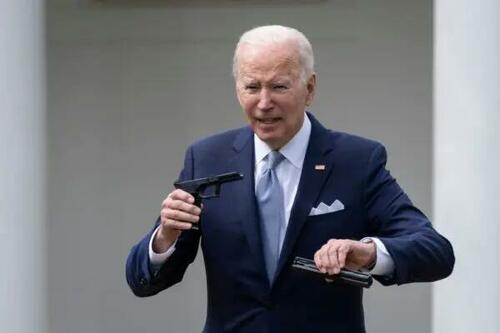
The ATF's updated rules, which went into effect in August 2022, redefined terms like "firearm," "frame," and "receiver" under the Gun Control Act of 1968 to address the proliferation of “ghost guns” assembled from kits.
The government argues that having no requirements for background checks, serial numbers, and other factors makes them attractive to criminals. On April 11, 2022, President Joe Biden vowed to crack down on "ghost guns."
"These guns are weapons of choice for many criminals," he said in the Rose Garden at the White House on April 11, 2022. "We're going to do everything we can to deprive them of that choice and, when we find them, put them in jail for a long, long time."
Authored by Caden Pearson via The Epoch Times (emphasis ours)
The ongoing legal battle over “ghost guns” has returned to the U.S. Supreme Court, where the Biden administration aims to regain authority over these “untraceable firearms,” following a recent victory for Second Amendment advocates.

On Thursday, roughly two months after it last brought this case to the Supreme Court, the Biden administration once again asked the justices to reinstate Bureau of Alcohol, Tobacco, Firearms and Explosives (ATF) regulations on “ghost guns.”
Solicitor General Elizabeth Prelogar told the justices that on Sept. 14 a lower court, the U.S. District Court for the Northern District of Texas, effectively undermined an Aug. 28 order by the nation’s highest court.
“This is the rare application where this Court has already applied the relevant legal standard in the very same case and determined the government should obtain emergency relief,” wrote Mr. Prelogar in her petition.
“The Court’s answer should be the same as it was two months ago,” she added, having argued that without the Supreme Court’s relief, “untraceable ghost guns will remain widely available.”
The prior Aug. 28 high court order in question was an administrative stay issued by Justice Samuel Alito that allowed the enforcement of an ATF rule designed to regulate “ghost guns” by defining them as firearms.
“Ghost guns” is a pejorative term for partially completed frames and kits that can be purchased and assembled into functional firearms. The Biden administration wants to impose a rule that makers of these “ghost guns” must obtain licenses, mark their products with serial numbers, maintain transaction records, and conduct background checks.
This rule was first blocked nationwide by Judge Reed O’Connor of the Northern District of Texas, an appointee of former President George W. Bush, on July 5. This ruling was then challenged in the Supreme Court, where Justice Alito intervened, issuing a temporary administrative stay.

‘Biden Admin Is Now in the Worst Place They Could Be’
Following the high court’s stay, two of the plaintiffs, a pair of firearm frame and receiver makers, returned to the Texas district court, asking it to enjoin the ATF from enforcing the rule specifically against them pending appeal.
Judge O’Connor granted this extraordinary relief on Sept. 14. Furthermore, the Fifth Circuit Court of Appeals subsequently partially upheld the district court’s ruling.
“[C]ourts should be able to review ATF’s 98-page rule, and the decades of precedent it attempts to change, without the Government putting people in jail or shutting down businesses,” the Firth Circuit Court of Appeals ruling stated.
This ruling effectively allowed the two plaintiff companies, Defense Distributed and 80 Percent Arms, to hold a monopoly as the only businesses allowed to sell firearm frames and kits to make “ghost guns” while appeals proceedings play out—a fact they touted in gloating statements following the ruling.
“The Biden admin is now in the worst place they could be: The true believer fanatics in this industry have achieved [a] commercial monopoly. Oops,” Defense Distributed stated in a blog post on Sept. 14.

In an Oct. 2 statement, 80 Percent Arms said they remain unwaveringly dedicated to “champion[ing] the right of every law-abiding citizen to privately craft firearms.”
In appealing the district court’s decision, Ms. Prelogar told the justices in her filing that Judge O’Connor relied on the same facts that had been considered by the Supreme Court, “yet reached diametrically opposing conclusions.”
“The district court insisted that the government is unlikely to succeed in reversing the court’s vacatur, that barring the government from enforcing the Rule would impose no irreparable harm, and that the balance of the equities favors respondents,” she wrote in her filing.
“The Fifth Circuit then relied on substantially similar reasoning to deny the government’s motion to vacate the injunction, dismissing the argument that the injunction violates principles of vertical stare decisis,” Ms. Prelogar continued.
The solicitor general acknowledged that the district court’s injunction “is narrower” than the prior July 5 ruling. However, she argued that it should be vacated because it “imposes essentially the same harms on the government and public” because the two companies continue to sell their products online “without background checks.”

The ATF’s updated rules, which went into effect in August 2022, redefined terms like “firearm,” “frame,” and “receiver” under the Gun Control Act of 1968 to address the proliferation of “ghost guns” assembled from kits.
The government argues that having no requirements for background checks, serial numbers, and other factors makes them attractive to criminals. On April 11, 2022, President Joe Biden vowed to crack down on “ghost guns.”
“These guns are weapons of choice for many criminals,” he said in the Rose Garden at the White House on April 11, 2022. “We’re going to do everything we can to deprive them of that choice and, when we find them, put them in jail for a long, long time.”
Loading…


